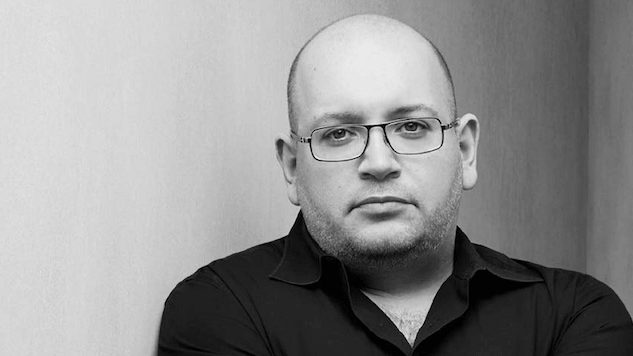After 544 Days in an Iranian Prison, Jason Rezaian’s New Book Reveals the Necessity of a Free Press
Photo by Beowulf Sheehan
It would be both disingenuous and insulting to compare the plight of journalists in the United States to nations with three-digit scores on the Press Freedom Index (countries black on the map). What Washington Post Tehran Bureau Chief Jason Rezaian endured in Iran’s Evin Prison cannot be compared to venomous tweets, no matter how viperine.
Yet it would also be foolish to not recognize that an adversarial stance by both the executive office and an alarming number of citizens threatens to erode the fundamental power of the Fourth Estate in a nation which prides itself on a robust, independent and accountability-forcing press corps. Unlike the regimes and juntas which suppress information with brute force, the American attack is less on journalists than their primary tenet: truth.
 With Prisoner, Rezaian shares the horrors of his descent from a journalist providing a nuanced view of Iran to a hostage taken by the most monstrous aspects of its government. (In a supreme act of “ungratefulness,” Rezaian had brought Anthony Bourdain to the country before being arrested—kidnapped, really.) Rezaian was seized and accused of espionage by Iran’s Revolutionary Guard Corps, despite not being the Islamic Republic’s actual intelligence agency: the Ministry of Information and Security. Myriad details of his life—contact with diplomats, a Kickstarter campaign to bring avocados to Iran—were deliberately tortured beyond all common sense in an attempt to build their case against him. This “justified,” as Rezaian came to understand, holding him long enough (544 days) to be a bargaining chip and attempt to scare out a confession. His brief dives into despair and fear are as fast as a free dive; mostly, Rezaian details his detention in rhetoric sharpened against Evin’s walls, as when he deems his captors “counterintelligence,” literally.
With Prisoner, Rezaian shares the horrors of his descent from a journalist providing a nuanced view of Iran to a hostage taken by the most monstrous aspects of its government. (In a supreme act of “ungratefulness,” Rezaian had brought Anthony Bourdain to the country before being arrested—kidnapped, really.) Rezaian was seized and accused of espionage by Iran’s Revolutionary Guard Corps, despite not being the Islamic Republic’s actual intelligence agency: the Ministry of Information and Security. Myriad details of his life—contact with diplomats, a Kickstarter campaign to bring avocados to Iran—were deliberately tortured beyond all common sense in an attempt to build their case against him. This “justified,” as Rezaian came to understand, holding him long enough (544 days) to be a bargaining chip and attempt to scare out a confession. His brief dives into despair and fear are as fast as a free dive; mostly, Rezaian details his detention in rhetoric sharpened against Evin’s walls, as when he deems his captors “counterintelligence,” literally.
Amid threats and interrogations—Rezaian was spared physical violence or corporeal torture, something the Iranians took great pleasure in juxtaposing with the treatment of inmates at Guantánamo, in case we needed any more reason to be ashamed of our own Devil’s Island—their strongest psychological weapon was isolation. Keeping him apart in his own thoughts where the lights never turned off seems to be what came closest to breaking Rezaian; the deprivation of information is in and of itself a form of torture.
Information is a fundamental human right. The ability to know what is happening, be it next door or in the very halls of power themselves, is a prerequisite for life in an open society. Information, and the journalism that delivers it, is a bulwark against oppression and corruption. It is the klaxon which awakens the citizenry; it is the police of the people. When the free flow of information is threatened, all democracy is threatened.
The black nations on the Press Freedom Index are some of the most repressive and dangerous on earth, places which demand the eyes and throats of the world hold them: Iran, China, Syria, Vietnam, Somalia, Azerbaijan, North Korea. These countries and others like them are essentially doing to their citizenry what the guards at Evin did to Rezaian; they have cut the lifeblood of free societies and hold their excised people hostage, prisoners of avarice and fear and ego.
A free press, for all its flaws—and it does have them, including a rabid desire for simplifying, a dependence on funds, a misuse of the megaphone—provides a vital function. The silencing of any voice—people of color, the LGBTQ community, people with disabilities, women—is untenable in a society which considers itself just. The silencing of the citizenry’s voice is a crime against humanity.
In Prisoner, Rezaian does what any journalist or interrogatee must: answer a question. How important is a free press?
B. David Zarley is a freelance journalist, essayist and book/art critic based in Chicago. A former book critic for The Myrtle Beach Sun News, he is a contributing reporter to A Beautiful Perspective and has been seen in The Atlantic, Hazlitt, Jezebel, Chicago, Sports Illustrated, VICE Sports, Creators, Sports on Earth and New American Paintings, among numerous other publications. You can find him on Twitter or at his website.







































